What is the South African Parliament Name?
The South African Parliament, officially known as the Parliament of the Republic of South Africa, is the country’s legislative body. Established in 1910 with the unification of four British colonies, it has undergone significant transformations throughout its history, reflecting South Africa’s journey from a segregated state to a multiracial democracy.
 South Africa Parliament Building
South Africa Parliament Building
Structure of the South African Parliament
The South African Parliament, much like many parliaments around the world, operates on a bicameral system, meaning it comprises two houses:
- National Assembly (NA): This lower house consists of 400 members elected through a system of proportional representation. The NA is responsible for passing legislation, overseeing the executive branch, and debating matters of national importance.
- National Council of Provinces (NCOP): Representing the interests of the nine provinces, the NCOP has 90 members. Its primary role is to ensure that provincial interests are considered in the national legislative process.
 South African Parliament Session
South African Parliament Session
A History Marked by Change
The South African Parliament’s history is deeply intertwined with the country’s tumultuous past. Under apartheid, a system of racial segregation enforced from 1948 to 1994, the Parliament was notorious for enacting discriminatory laws. Black South Africans were denied representation, their voices silenced within the halls of power.
The dismantling of apartheid ushered in a new era for the Parliament. The first democratic elections in 1994 saw the formation of a Government of National Unity, with Nelson Mandela as President. This marked a significant turning point, transforming the Parliament into a symbol of unity and reconciliation.
“The South African Parliament, once a tool of oppression, became a beacon of hope, reflecting the aspirations of a nation striving for equality and justice,” says Dr. Nomsa Mbeki, a prominent historian specializing in South African political history.
The Role of the Parliament in a Democratic South Africa
In present-day South Africa, the Parliament plays a crucial role in upholding the principles of democracy. It serves as a platform for debate, deliberation, and the passing of legislation that impacts all aspects of South African Life.
Key functions of the South African Parliament include:
- Lawmaking: Drafting, debating, and passing laws that govern the country.
- Oversight: Holding the executive branch accountable for its actions and ensuring transparency.
- Representation: Providing a voice for all South Africans, regardless of race, ethnicity, or political affiliation.
 South African Citizens Protesting
South African Citizens Protesting
Visiting the South African Parliament
The South African Parliament building, located in Cape Town, is a significant historical landmark. Guided tours offer visitors insight into the workings of the Parliament and its history. Attending a parliamentary debate is a unique opportunity to witness democracy in action.
FAQs about the South African Parliament
1. How often are elections held for the South African Parliament?
National elections are held every five years.
2. Can the public attend parliamentary debates?
Yes, members of the public can attend debates in both the National Assembly and the National Council of Provinces, subject to certain rules and procedures.
3. What are the official languages used in the South African Parliament?
While South Africa recognizes 11 official languages, English is predominantly used in parliamentary proceedings.
4. Who is the current Speaker of the National Assembly?
To find the most up-to-date information on the current Speaker of the National Assembly, you can visit the official website of the Parliament of the Republic of South Africa.
5. What is the role of the opposition parties in the South African Parliament?
Opposition parties play a crucial role in holding the government accountable, scrutinizing legislation, and offering alternative viewpoints.
For those interested in delving deeper into the cultural landscape of the African continent, our website offers a wealth of information. Discover more about African countries where German is spoken or explore the vibrant tapestry of the African American music timeline.
Understanding the South African Parliament is key to understanding the country’s political landscape. It stands as a testament to the triumph of democracy over adversity, and its continued evolution reflects South Africa’s ongoing journey towards a more just and equitable society.
For more information or assistance, please don’t hesitate to contact us:
Phone: +255768904061
Email: kaka.mag@gmail.com
Address: Mbarali DC Mawindi, Kangaga, Tanzania.
Our dedicated customer service team is available 24/7 to assist you.

